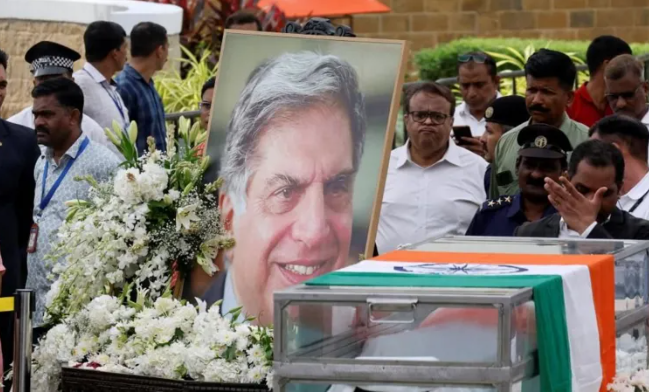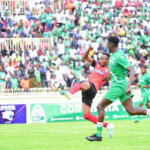The funeral of Ratan Tata, former chairman of India’s Tata Group, took place in Mumbai on Wednesday following his death at the age of 86. His passing has led to an outpouring of tributes from business leaders, politicians, and celebrities, all of whom came to pay their respects.
The funeral was marked by a day of mourning in Maharashtra state, and Tata’s coffin was given a military salute before being taken for cremation. His body lay in state at the National Centre for Performing Arts in Mumbai, where thousands gathered to honor him. His casket was draped in the Indian flag and adorned with wreaths of white flowers.
Among the prominent figures present were business magnate Mukesh Ambani, Home Minister Amit Shah, and Bollywood actor Aamir Khan. Ratan Tata’s dog, Goa, also attended the ceremony, accompanied by two Tata employees. The dog, rescued from the streets of Goa, was named after the state.
Tata, known for his modesty and philanthropy, is remembered not just for his business acumen but also for his contributions to animal welfare, health, and education. The Tata Group, under his leadership from 1991, grew into a global powerhouse, with annual revenues surpassing $100 billion. His tenure saw major acquisitions, including the British steelmaker Corus, luxury car brands Jaguar and Land Rover, and the global tea brand Tetley.
Following Tata’s death, the Tata Group issued a statement, stating, “His legacy will continue to inspire us as we strive to uphold the principles he so passionately championed.”
Ratan Tata’s tenure as the chairman of the Tata Group, which began in 1991, is remembered for both successes and challenges. While some of his decisions, like the acquisition of Jaguar Land Rover and Tata Steel, solidified the group’s global presence, others, such as the telecom venture and the Nano car (marketed as the world’s cheapest car but ultimately unsuccessful), did not meet expectations and incurred losses.
Born into a traditional Parsi family in 1937, Tata pursued his education in architecture and structural engineering at Cornell University in the US. In 1962, he began his career with Tata Industries, the promoter company of the Tata Group. He spent time training at Tata Steel’s plant in Jamshedpur, and over the years, worked with various group companies, including Tata Iron and Steel Company (Tata Steel), Tata Consultancy Services (TCS), and Nelco (National Radio and Electronics).
Ratan Tata’s leadership came after JRD Tata, who had led the group for over 50 years, appointed him as his successor. Ratan Tata considered JRD Tata a great mentor, often referring to him as a father and brother. In 2008, Tata’s contributions were recognized by the Indian government when he was awarded the Padma Vibhushan, the second-highest civilian honor in India.
Indian Prime Minister Narendra Modi paid tribute to Tata, calling him a “visionary business leader, a compassionate soul, and an extraordinary human being.” Tata’s legacy extends beyond business, encompassing his humanitarian efforts and leadership in shaping India’s corporate world.



